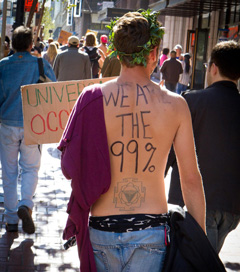San Francisco – Before word swept through Occupy SF of an impending police raid, the camp at the south end of Justin Herman Plaza was largely a crash pad for chronically homeless people, with a contingent of activists thrown in to push the core message of denouncing economic disparity.
Then came the raid that didn't come.
By midday Thursday, the sun shone on an utterly transformed encampment.
Suddenly, there were people who looked more like office workers than hippies strolling among the 50 tents pitched on the concrete and grass. Tourists gave high-fives to the campers. A group resembling yoga instructors set up a huge rug and spent the afternoon meditating.
Overnight, it went from Rainbow Nation redux to a kind of cross between an antiwar demonstration and a company picnic.
'Energized everyone'
“I think that thing last night just energized everyone, and they've been passing the word that if you're not here for the real protest, you might want to go somewhere else,” said John Tunui, a painter who manages dozens of street-artist booths next to the encampment. “It's a different camp now.”
He and his fellow vendors were complaining as late as Tuesday that since Occupy SF set up at the plaza three weeks ago, street people had been dominating the camp and stealing from their booths. But by Thursday, the problem was virtually over, Tunui said.
“We like their message, and I guess we're learning to coexist,” he said.
More than 300 protesters gathered Wednesday night after word swept through the camp that the mayor and police force would make good on warnings to clear the tents out because of what they said were sanitation and illegal camping violations. By midnight, demonstrators had been joined by a phalanx of union leaders and politicians, including two mayoral candidates, Supervisor John Avalos and state Sen. Leland Yee.
Police with batons and helmets gathered near the plaza, and the protesters girded for passive resistance. But the raid never came.
Police explanation
Officer Carlos Manfredi, a police spokesman, said the department was worried that decamped protesters from Occupy Oakland would flood into San Francisco late Wednesday. About 1,000 Occupy Oakland demonstrators tried to board BART around 11 p.m., only to find that the transit agency had locked the two main downtown stations. The Embarcadero Station also was closed.
“In light of what happened in Oakland, we wanted to be prepared,” Manfredi said. “In preparation, we made use of the time by assembling all of our officers to be ready in the event there would be any kind of incident.”
The sense in the Occupy SF camp, however, was that a show of force had scared off the police – an impression reinforced when Mayor Ed Lee said officials would be “dialoguing” with the protesters. Some activists seized on the sense of momentum to try to make changes.
On Thursday, they redoubled outreach to homeless people and others sleeping out in the plaza to enlist them in the cause – a politically sensitive way of trying to make Occupy SF more of a movement than a homeless camp. The idea is to be inclusive but goal-oriented, said several activists who didn't want to be named for fear of being perceived as unwelcoming.
“They want you to help out, but I'm really not into all that political stuff,” said Johnnie Buck, 50, who has been homeless for years in the area. “So I'm sleeping across the street. I like their message, and some of the other guys are cool with helping. I'm more into my own thing.”
Many protesters said they had attracted new blood with the police raid that wasn't. The camp had about 200 people earlier this week but now hosts about 300.
Occupy SF was always relatively tidy, for an outdoor encampment, with volunteers who regularly swept up. This week, four portable toilets arrived. Colorful “We are the 99 percent” signs proliferated overnight to spill onto nearby walkways.
'An awakening'
“This is an awakening,” said Tim Andres, a 60-year-old contractor who has been helping at both the Oakland and San Francisco camps. “It's like the check-engine light is on in this country, and people are finally noticing, gosh, we're in bad shape.”
Ying Lee, 79, of Berkeley, who brought a group of her fellow Grandmothers Against the War to the San Francisco camp, said: “We grandparents have been saying, where are the young people making change? And now we are just overjoyed to see them fighting for their futures.”
Chronicle staff writers Vivian Ho, Michael Cabanatuan and Jaxon Van Derbeken contributed to this report. E-mail Kevin Fagan at [email protected].
Join us in defending the truth before it’s too late
The future of independent journalism is uncertain, and the consequences of losing it are too grave to ignore. To ensure Truthout remains safe, strong, and free, we need to raise $47,000 in the next 8 days. Every dollar raised goes directly toward the costs of producing news you can trust.
Please give what you can — because by supporting us with a tax-deductible donation, you’re not just preserving a source of news, you’re helping to safeguard what’s left of our democracy.
